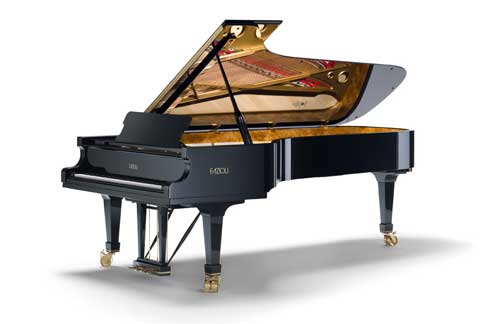Fazioli currently offers six models of grand pianos, the largest being the Fazioli F308, which at 3.08 m (10 ft 2 in) in length is the longest piano available in the world market.

The Fazioli is noted for its inclusion of a fourth pedal on the F308. This pedal brings the hammers closer to the strings, decreasing the volume while maintaining a normal tone, functioning just like the soft pedal on an upright piano.
On Wednesday, July 17, the Fazioli F308 will be a vital component of the Midsummer’s Music Festival Extravaganza, “Music for a Grand Parlor” at The Ellison Bay Estate, beginning at 4 PM.
Featuring:
Quartet in D Major, K285
Wolfgang Amadeus Mozart
Septet in D Minor, Opus 74
Johann Nepomuk Hummel
Sextet in Bb Minor, Opus 63
Sergei Liapunov
In 1944, Paolo Fazioli, the youngest of six sons, was born. His father ran a successful furniture factory in Rome. Paolo demonstrated a high level of musical talent, as well as a strong interest in pianos. Later, while continuing his piano studies, he attended the University of Rome as an engineering student, a requirement for managing the family business. During his studies, Paolo visited laboratories working on pianos and restoration, while studying the available literature on the subject.
In 1969, Paolo earned his university diploma as an engineer at the University of Rome.
In 1971, Paolo earned his degree as a Pianist at the Conservatory G. Rossini in Pesaro under the instruction of Maestro and head professor Sergio Cafaro; later of the Conservatory Santa Cecilia in Rome. He also received a Master Degree in Music Composition at the Rome Music Academy where he was guided by the composer Boris Porena.
In the meantime, the elder brothers had broadened the family business and introduced new technology for wood processing. Two new factories in Sacile had been bought for the production of wooden office furniture, as well as a further factory in Turin for the production of metal furniture. In Sacile, exotic and unique wood species were used, including Teak, Rosewood and Mahogany. The furniture is exported throughout the world under the brand of MIM (Mobili Italiani Moderni). Paolo Fazioli enters the company upon graduation, starting in Rome, afterwards moving to Turin and gaining a deep knowledge of scientific wood processing as well as production. Now confident in his planning and production skills, he starts his project of building grand pianos, beginning with a detailed study of contemporary grand piano production; analyzing the instruments consistency and performance while querying researchers and critics. His father and eldest brother Vigilio, an expert in wood technology, are hugely supportive. From his elder brothers he obtains the necessary support for research, development and production. With the finest technology and analysis available Paolo Fazioli defines the parameters of the piano that he wants to build. He is convinced, that by using a range of design changes, developed from the most modern acoustical research and material development, he will be able to build an outstanding instrument.
In 1978 Paolo Fazioli, an engineer and pianist, brought together a team of specialist technicians, including mathematicians, acoustic physicists, wood technologists, piano makers and pianists to “define the process for the construction of a conceptually new piano”. Fazioli Pianoforti s.r.l. was formally established in January 1981. In the same year, the traditional piano technician’s specialist skills combined with the research, experience and know-how of the engineer can be put into practice. A production facility, the “Fabbrica di Pianoforti Fazioli” is built within the Sacile furniture factory, about 60 km north of Venice. The choice of the factory fulfills a number of organizational and production needs: materials are close at hand, as well as research and analytic laboratories, and most importantly, specialized craftsman. Tragically, Paolo’s father Romano who passionately supported his son’s initiative and smoothed the way for his future success, passes away before the factory begins production.

